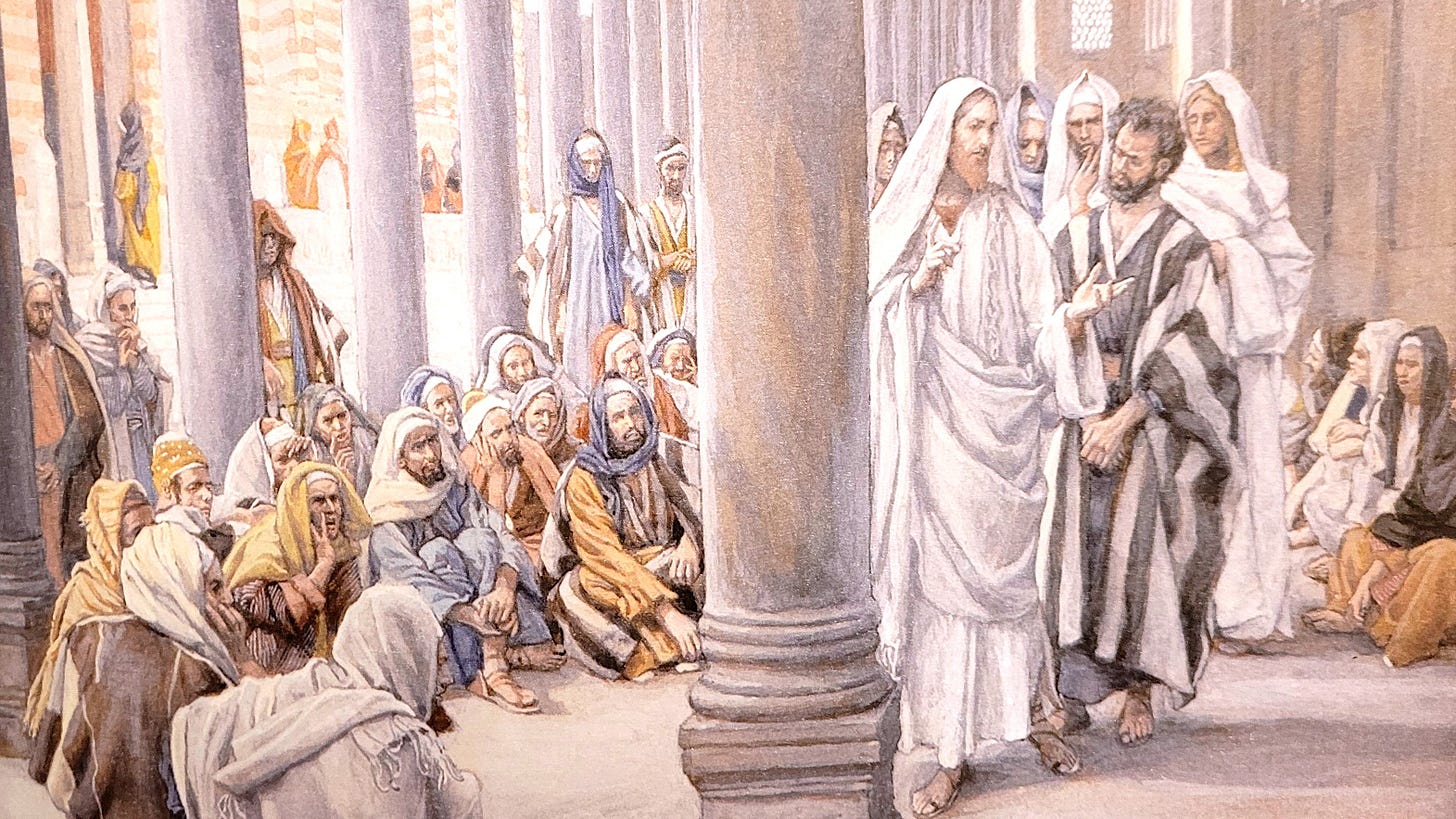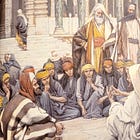Why did Christ say ‘the truth will set you free’?
Faith in Christ, who is 'lifted up' on the Cross, is the only path to freedom.

Faith in Christ, who is 'lifted up' on the Cross, is the only path to freedom.
Editor’s Notes
In the previous part, Our Lord warned his enemies that they would die in their sin, due to their unbelief—and now he speaks to them, obscurely, about what will happen when they “lift him up” on the Cross.
In this part, Fr Coleridge tells us:
How Christ promises freedom to those who follow him, and exposes those who refuse it.
That the faith is the foundation of liberation from sin and fear.
Why Christ’s offer of freedom provokes outrage from those who cannot bear to be told they are slaves.
He shows us that sin blinds the soul to its own chains, and that only the Son can make men free indeed.
For more context on this episode, its significance and its place in the Roman Liturgy, see here:
Disputes in the Temple
The Preaching of the Cross, Part I, Chapter XIII
St. John viii. 12-20.
Story of the Gospels, § 93
Burns and Oates, London, 1886
Headings and some line breaks added.
Sung on Passion Sunday
How did the Sanhedrin know Christ would affirm his divinity under oath?
What prevented the Jews from hearing Christ’s words properly?
How is Satan ‘a murderer’ and ‘the father of lies’?
What did Christ mean by, ‘Before Abraham was made, I AM’?
‘Lifting up’ the Son of Man
The words which next follow may have been directly consecutive on the former, but of this we cannot be certain in these reports of St. John. There is certainly some connection of subject-matter, but the tone of our Lord is more conciliating and less upbraiding than on the former occasion. It seems as if He was inclined to give up the attempt to convert them for the time, and leave them to the hope of what might be after His great Sacrifice was accomplished.
‘Jesus therefore said to them, When you shall have lifted up the Son of Man, then shall you know that I am He, and that I do nothing from Myself, but that as the Father hath taught Me these things I speak.’
The lifting up the Son of Man was the phrase by which on this and on other occasions He spoke of the Death on the Cross, when He did not wish to speak without a certain amount of obscurity, in order not to excite curiosity and provoke questioning. It is as if He had said to them that now they would not listen to Him nor accept the many proofs by which the Father in His Providence had authenticated His Mission, but that the time would come when they would be different.
They would lift up the Son of Man, that is, they would bring about His Death upon the Cross, and thus be the external instruments in that great Sacrifice of His by which the world was to be redeemed. Among the fruits of that great Sacrifice would be an outpouring of grace, even upon His enemies, in reward for the consummate obedience which He was to show to His Father therein. Then there would be many among them who would know, by means of the grace then shed abroad, Who He was, and how perfectly He had been in all things the Messenger and Mouthpiece of His Father.
The result of the Passion would be the institution of the Church, and her enrichment by the Holy Ghost with all the wonderful powers which would enable her to discharge charge her loving mission of the application of the merits of our Lord for the benefit of souls. There would be a great diffusion of grace, and great numbers of the Jews, and even of the priests of Jerusalem, would be brought into the true fold.
Our Lord looking forward
This then our Lord looks forward to, with joy and consolation, and He holds out the prospect even to His enemies, many of whom would then be made His friends. This shows us how constantly and how lovingly He kept in His Heart the thought of the Sacred Passion.
There may also be another strain of thought in the words, as if He might have looked forward to the convincing proof which the Passion and its issues would afford of the truth of His Mission, though at the same time there would be some among them who would not profit by the splendid demonstration, and by the floods of grace which it would let loose over the nation and the world at large, but would be only more hardened thereby. Still they would know the truth of His Mission and of His words, almost in the same way as the devils who believe and tremble, though without the power or the will to be converted.
Our Lord ends His passage with a loving expression of thankfulness to His Father, Who had not only sent Him into the world, and given Him the words which He was to speak therein, but had most faithfully guided and tended Him in His Providence.
‘And He that sent Me is with Me, and He hath not left Me alone, for I do always the things which please Him.’
The constant presence and companionship of the Father with the Son in His work upon earth is proved by the truth that He doth always the things which please the Father, having as God one will and one operation with Him, and being in His Sacred Humanity perpetually guided and moved by the Holy Ghost to do exactly the things at each moment which are pleasing to Him.
The Father Coleridge Reader is a labour of love. But curating, cleaning up and publishing these texts takes a lot of time. Every now and then, we have to make one of the posts for members only, in order to keep it going.
Please consider joining us with a subscription!




